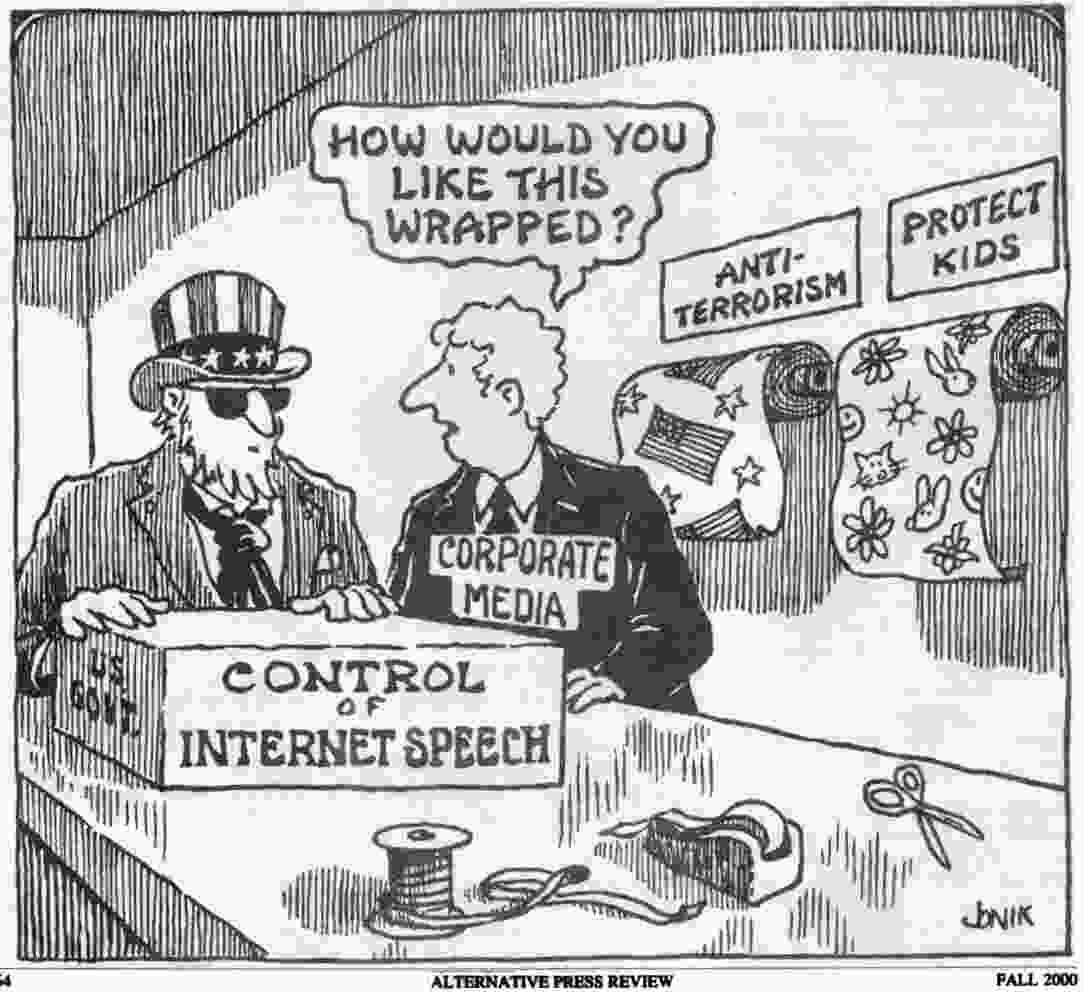Free Speech and Privacy on the Internet
Free Speech
The debate over free speech on the Internet has been centered around the fact that the Internet has no controlling authority to monitor what information or opinions are presented and who can access that information. The Internet is a new medium that can be compared to many existing modes of communication like books, newspaper, radio, and television, but is ultimately different from all of these modes in the sense that it embodies new interactive technology that poses the problem of regulation of what is said and what can be accessed, and by whom. The interpretation of the First Amendment is key in this debate.
1st amendment: Congress shall make no law respecting an establishment of religion, or prohibiting the free exercise thereof; or abridging the freedom of speech, or of the press, or of the people peaceably to assemble, and to petition the government for a redress of grievances.

Does the Internet embody a new type of medium that challenges old conceptions of free speech and what should be allowed/considered protected under the first amendment? Do regulations of free speech on the Internet interfere with the American perception of democracy?
The Internet has proved itself to be a unique means for free expression and discourse. However, this also challenges existing preconceptions over what type of speech on the Internet should be allowed and considered to be protected under the First Amendment. Although many people feel that obscene material, hate speech, child pornography, and false advertising should be censored on the Internet, others feel that any censorship at all is direct violation of First Amendment rights.

If one does come to the conclusion that there should be some form of regulation of free speech on the Internet, the problem also arises of the best way to implement that regulation. Where should the responsibility lie? The Government, Corporations, Internet Service Providers, or the Individual? The major attempts by government to regulate the Internet have been deemed unconstitutional by the Supreme Court. The Communications Decency Act of 1996 was intended to make the publishing of “indecent” or “patently offensive” material on the Internet illegal. In ACLU v. Reno, the Supreme Court granted the highest protection of free speech to the Internet. (For more information on this court decision, click here) Again in 2002, the Children’s Online Protection Act, meant to ban material that is considered harmful to minors, was sent back to a lower court for review. (For more information about this case, click here)

There are many companies that offer filtering software to parents who wish to protect their children from offensive material on the Internet. Some people argue that this is a better, more effective way to monitor internet content accessible to children without infringing on the rights of other citizens. Cyberpatrol is one of these programs.
Privacy
Although the Internet seems to be anonymous, there are many ways of tracking which sites and individual has visited, accessing personal information, and intercepting email. Currently, there are only a few laws that regulate what private Internet companies can do with the personal information that they collect. Most people agree that there should be new laws enacted that apply explicitly to the issue of privacy on the Internet

In the wake of September 11, the government has made new laws regarding the use of encryption programs to protect private information. John Ashcroft and the Department of Justice passed the Patriot Act through Congress, which provided an unprecedented level of electronic surveillance to be available to law enforcement agencies in the name of combatting terrorism. Critics of the Patriot Act say that it unnecessarily infringes on essential civil liberties granted by the Constitution. (For a the complete version of the Patriot Act, click here) In the debate over the “right to be left alone” on the Internet, again interpretation of Constitution lies at the center of the issue, this time in the Fourth Amendment.
4th amendment: The right of people to be secure in their persons, houses, papers, and effects, against unreasonable searches and seizures, shall not be violated, and no warrants shall issue, but upon probable cause, supported by oath or affirmation, and particularly describing the place to be searched, and the persons or things to be seized.

Although this amendment does not explicitly guarantee the right to privacy, and the term privacy is not even used, the Fourth Amendment has often been interpreted as defining privacy as a civil right. Is privacy an essential part of American democracy, or should certain civil liberties be overlooked in the interest of national security? If privacy is in fact a right, should it override the right of others to access information?

links:
This website is the Electronic Frontier Foundation’s “Blue Ribbon” campaign for free speech online
http://www.publicagenda.org/issues/frontdoor.cfm?issue_type=internet
This site talks about the issues that arise regarding privacy and free speech in the new medium of the internet
This site enumerates the many ways that people can be monitored on the Internet
www.gvu.gatech.edu/.../ Internet_Privacy_Laws.html
This is a survey showing that most people are concerned about their Internet privacy
http://www.netatty.com/privacy/
This is a site that explains the basic current laws regarding Internet Privacy
http://www.alternet.org/story.html?StoryID=15541
http://www.democraticunderground.com/articles/01/12/05_unamerican.html
Some criticism of the Patriot Acts